(CNN) — If you follow luxury resorts or travel influencers on Instagram, odds are good that you’ve seen at least one “floating breakfast.”
In case you’re not familiar with them, here’s what to know: they’re your typical upscale hotel room service breakfast — think toast, fruit, coffee and the like — served in a pool or hot tub instead of in bed. Usually, they’re placed on large platters or colorful baskets, then accessorized with bright tropical flowers to make them even more photogenic.
Nearly everyone agrees that the trend began in Bali, although no specific resort seems to get the credit for coming up with the idea first.

Gorgeous scenery plus yummy food equals perfect social media bait.
Shutterstock
“Across the course of the past year, in-suite dining has become extremely popular, especially for those seeking solace in the safety and comfort of their suite,” Jann Hess, general manager at Amanjiwo in Bali, tells CNN Travel. “The floating breakfast is a popular choice.”
After all, the floating breakfast needs a pool to float in — and a private plunge pool is a much better choice than a shared pool where a splashing kid might make the whole thing topple over.
Beyond the ‘gram
Though the gorgeous colors and dramatic plating of floating breakfasts make them perfect for social media, asking people to stand in the pool before they’ve fully woken up or had caffeine seems like a potential recipe for disaster.
Are these breakfasts just made to be shared online and discarded, or do people genuinely enjoy eating them?
He tells CNN Travel that, for him, the lush meal worked better in concept than in execution. Though Booth had pre-scheduled a specific time for the breakfast to arrive, he ended up oversleeping about 20 minutes, meaning he’d missed the optimal window for consuming it.
“I realized that because it was a humid environment, leaving your breakfast out was maybe not ideal,” he says.
Although the food was already getting cold, he was determined to get an Instagram shot of the fancy setup before chowing down. The hotel’s staff had wisely placed the trays in a separate section of the pool, but he moved them into the larger area in order to stage the scene.
That ended up in trays floating off in different directions and him, still bleary-eyed, trying to corral it all.
“I was too embarrassed to ask for help,” he confesses, “so I spilled everything everywhere. The coffee had a bit of pool water in it, and the bread was soggy.”
Still, Booth is careful to pin the blame on himself and not on the resort employees who organized the meal.
“I think it’s a bit violent to jump in the water first thing when you wake up,” he says.
If he were going to do the experience over again, he’d make a couple of changes, namely drinking the coffee first so he’d be alert enough not to knock anything over and finding a spot in the pool where he could sit down to eat instead of have to stand around awkwardly.
Floating the idea
The floating breakfast has quickly become yet another luxury hotel amenity, like afternoon tea or a turndown treat. Amid the pandemic, domestic travelers taking advantage of affordable staycations have also embraced floating breakfasts.
Timo Kuenzli, general manager of Koh Samui’s all-pool-villa Cape Fahn Hotel, says that nearly 100% of their guests over the past year have ordered one.
“We can definitely see that the Asian market is way more into having Instagrammable moments to capture than other markets,” he says.
In addition to the photos being beautiful, they also serve as a free marketing tool — people see the breakfasts online, check out the location tag, and then want to get in on the experience themselves when they stay at Cape Fahn later.
And due to its growing presence, resorts have to keep upping the ante in order to make their offering stand out.
The Six Senses Uluwatu in Bali (pictured above) serves theirs in a red heart-shaped basket. The Anantara in Koh Phangan, Thailand, has a floating “sunset sushi” extravaganza. Cape Fahn is working on a floating afternoon tea experience.
Regardless of your personal opinion on the merits of Instagram-centric hotel offerings, it looks like these floating meals have gone from fad to mainstay. Just remember to drink the coffee first.
